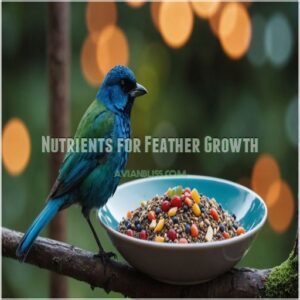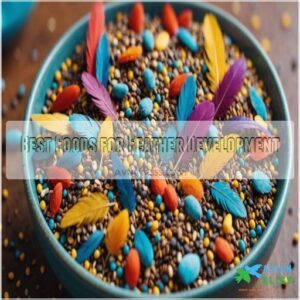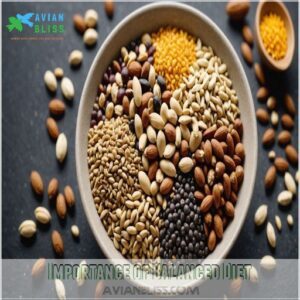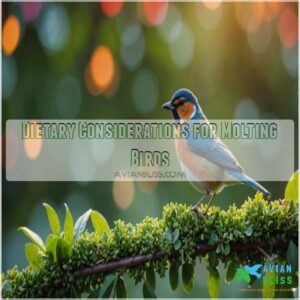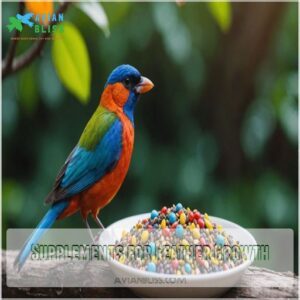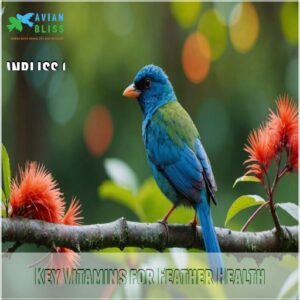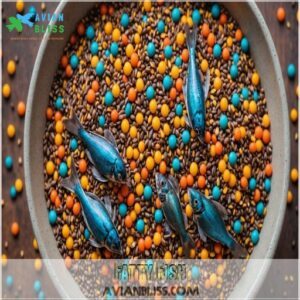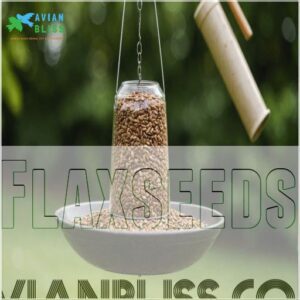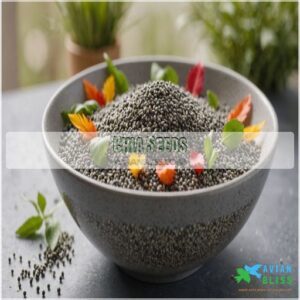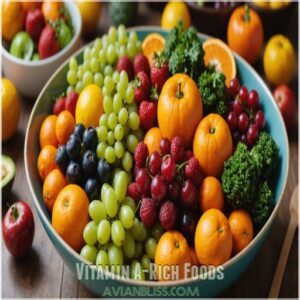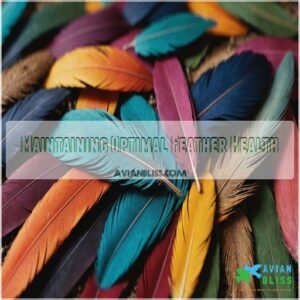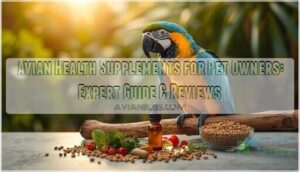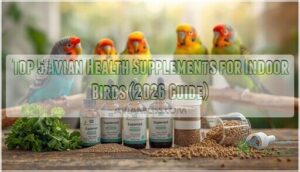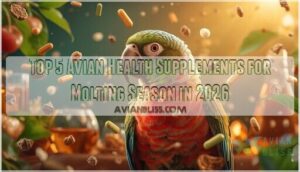This site is supported by our readers. We may earn a commission, at no cost to you, if you purchase through links.
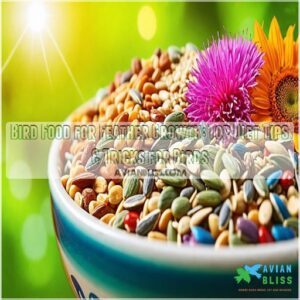
Think of it as a spa day for their feathers! Leafy greens, fruits, and high-quality pellets are your go-to items. Don’t forget supplements like biotin – it’s like hair vitamins for birds! A balanced diet is key, just like how you can’t live on pizza alone (though we’ve all tried).
Stick around to discover the secret ingredient that’ll make your bird’s feathers absolutely fabulous!
Table Of Contents
- Key Takeaways
- Nutrients for Feather Growth
- Best Foods for Feather Development
- Importance of Balanced Diet
- Dietary Considerations for Molting Birds
- Supplements for Feather Growth
- Key Vitamins for Feather Health
- Omega-3 Fatty Acid Sources
- Vitamin A-Rich Foods
- Maintaining Optimal Feather Health
- Frequently Asked Questions (FAQs)
- What foods are good for birds?
- What do birds need to eat?
- Is featherup good for molting birds?
- How can a bird’s feathers grow back?
- What promotes bird feather growth?
- Which mineral is important for feather growth?
- What is good for chicken feather growth?
- How to treat feather loss in birds?
- How often should I change my birds diet?
- Can overfeeding protein harm my birds feathers?
- Are there foods that can hinder feather growth?
- How long does it take to see dietary improvements?
- Should I adjust feeding during different seasons?
- Conclusion
Key Takeaways
- Provide a balanced diet rich in proteins, omega-3 fatty acids, and vitamins A and E to support healthy feather growth and maintenance.
- Offer a variety of foods including lean meats, eggs, leafy greens, and orange fruits and vegetables to ensure your bird gets all necessary nutrients.
- Adjust your bird’s diet during molting seasons, increasing protein intake with options like gamebird feed or boiled eggs.
- Supplement your bird’s regular diet with treats like flaxseeds or chia seeds for an extra boost of omega-3s, but remember to use moderation.
Nutrients for Feather Growth
To make sure your bird flaunts a fabulous feathered coat, focus on providing the right nutrients like proteins, omega-3 fatty acids, and essential vitamins.
Think of it as a beauty regime for your feathered friend—just without the fancy salon!
Proteins for Feather Strength
For strong feathers, proteins are your bird’s secret weapon.
Did you know feathers are mostly keratin?
To boost feather quality, consider these protein-rich foods:
For best results, make sure your bird’s diet includes a balanced mix of macronutrients for birds.
- Lean meats like chicken to support amino acid balance.
- Boiled eggs for complete proteins.
- Legumes and seeds as plant-based options.
Avoid protein deficiency signs by ensuring a varied diet.
Omega-3 Fatty Acids for Shine
Strong proteins build feather structure, but for that enviable shine, you need omega-3 fatty acids!
Think of them as nature’s feather conditioner.
Salmon, sardines, flaxseeds—these are your omega-3 superstars.
Adding these to your bird’s diet boosts feather quality and creates Shiny Feathers.
It’s a simple way to improve your bird’s appearance and overall Health Benefits.
Don’t underestimate the power of a good diet for amazing feather care!
Vitamin a for Color
Bright feather colors catch the eye, don’t they?
That pop of color often hints at a diet rich in Vitamin A.
Without it, your bird might look a bit dull—kind of like a faded painting.
Vitamin A supports feather pigmentation and growth through carotenoids.
Consider adding leafy greens and orange veggies to their diet for vibrant colors and healthy feather growth.
Biotin for Density
Colorful feathers are just part of the equation—let’s talk density.
Biotin, a vitamin B complex superstar, works wonders for feather health.
Birds lacking this might show brittle feathers.
Boosting biotin helps during molting and promotes strong plumage.
For good results, consider incorporating specialized feather growth food into their diet.
- Biotin deficiency symptoms: Brittle feathers, poor growth
- Biotin supplements: Easy fix for feather issues
- Biotin in feed: Essential for overall health
Best Foods for Feather Development
In terms of feather development, choosing the right foods can turn your bird’s plumage from drab to fab.
A mix of homemade diets and commercial feeds works wonders.
Foods rich in protein, omega-3 fatty acids, and vitamin E are essential.
Incorporating high-energy suet treats can provide a boost of fat for birds, especially during cold weather.
Here’s a handy table to guide you:
| Food Type | Nutrients | Benefits |
|---|---|---|
| Eggs | Proteins | Supports feather growth |
| Fish (Salmon) | Omega-3 Fatty Acids | Enhances luster |
| Carrots | Vitamin A | Boosts color |
| Nuts/Seeds | Vitamin E | Protects follicles |
A sprinkle of humor—think your bird with a salon-fresh look—adds charm to the routine!
By mindfully selecting foods, you’ll make sure every stage of feather growth shines with health.
Importance of Balanced Diet
To keep your feathered friends looking their best, it’s essential to provide a balanced diet packed with proteins, vitamins, and minerals.
Think of it as giving them a wardrobe upgrade, ensuring each feather is vibrant, strong, and ready to impress.
Protein-Rich Foods
You’ve explored feather-friendly foods.
Now, let’s chat about protein-rich foods.
Proteins are essential for feather growth and development, balancing amino acid levels, and preventing feather plucking.
Consider options like lean meats, eggs, and plant-based proteins such as legumes and seeds.
A balanced diet that includes nutrient-rich foods, such as mealworms and fruits like berries that make up nearly 10% of a robin’s diet and provide a source of vitamins and antioxidants understanding robin dietary needs. This protein-packed diet supports avian nutrition, ensuring your bird’s feathers are strong and vibrant, just as nature intended.
Vitamin-Rich Foods
After considering protein-rich foods, focusing on vitamins can offer significant feather benefits.
Vitamins play a key role in feather health, with Vitamin E supporting cell membranes and Vitamin A enhancing color.
Check out these four vitamin-rich foods:
- Leafy greens for Vitamin A sources.
- Nuts rich in Vitamin E benefits.
- Biotin supplements.
- Natural alternatives like fruits.
Mineral-Rich Foods
Getting enough vitamins is great, but don’t forget minerals!
Calcium is key for strong bones and eggshells; think of it as the bird’s internal scaffolding.
Zinc and iron help with feather regeneration and overall health.
Mineral sources like cuttlebone provide calcium, while grit aids digestion.
A balanced diet, including these minerals, helps your feathered friend thrive.
Remember, healthy minerals mean healthy feathers!
Dietary Considerations for Molting Birds
When your bird starts molting, it’s like swapping out last season’s wardrobe for something new, and the right diet can make a world of difference.
Gamebird feed can boost protein intake, while mixing in layer feed and scratch grains can provide a balanced nutritional foundation.
Gamebird Feed
When your feathered friends enter a molting phase, consider gamebird feed for an effective makeover.
With 28% protein, it’s higher than layer feed and helps speed up feather growth, bridging those bare spots with ease.
Though pricier, brands like Purina and Manna Pro can make a noticeable difference.
Balancing bird food for feather growth can prevent nutrition deficiencies and support a healthy bird diet.
Layer Feed
Layer feed is your go-to for maintaining egg quality, but what about molting birds? Consider these tweaks:
- Boost Protein: Add boiled eggs to increase protein content.
- Alternatives Available: Explore layer feed alternatives to avoid nutritional gaps.
- Balance: Monitor feeding frequency to prevent deficiencies.
- Wellness Focus: Maintain avian wellness with a varied diet.
Scratch Grains
Scratch grains, both a blessing and a curse, liven up any bird’s diet.
While diverse types entice your feathery friends, their low protein content (around 10%) falls short for molting needs, risking poor feather growth, which can lead to feather plucking problems.
Opt for grains as treats, not staples.
Monitoring your parrot’s droppings can help identify nutritional deficiencies that affect feather growth, as healthy droppings are essential for overall health. Consider protein-rich alternatives like boiled eggs or gamebird feed for good bird wellness and parrot health during molting.
Supplements for Feather Growth
You’ll be amazed at how the right supplements can transform your bird’s feathers from dull to dazzling, just like giving your feathered friend a natural makeover.
When your bird’s regular diet needs an extra boost, you can add protein powerhouses like boiled eggs, lean meat scraps, or quality cat food to support healthy feather growth.
Boiled Eggs
Boiled eggs pack a powerful punch for your feathered friends’ growth needs.
You’ll want to offer them twice weekly, making sure to include both the protein-rich yolk and calcium-packed shells.
Here’s a pro tip: crush the shells finely to prevent any choking hazards.
The yolk’s natural vitamin D helps your birds absorb nutrients better, while the whites provide essential amino acids for those gorgeous new feathers.
Meat Scraps
To keep your bird’s feathers vibrant and healthy, ensure they’re getting enough essential vitamins for bird health Boosting feather health with Vitamin A. Transform your bird’s feather health with carefully chosen meat scraps that pack a protein punch.
You’ll want to offer lean, cooked pieces of chicken, turkey, or fish about twice a week as supplements.
Remember to remove any excess fat and avoid seasoned or processed meats that could harm your feathered friend.
Think of meat scraps as special treats – they’re powerful protein boosters, not daily staples.
Cat Food
High-quality cat food can be your bird’s secret weapon for fabulous feathers.
You’ll want to choose premium brands rich in protein and taurine – they’re like nature’s multivitamin for your feathered friend.
Start with small serving sizes, about a teaspoon per day, mixed with regular feed.
While it might seem unusual, many bird nutrition experts swear by this trick for promoting healthy plumage.
Key Vitamins for Feather Health
You’ll find it fascinating how vitamins E, B Complex, and D work together like a beauty treatment for your bird’s feathers.
Just like humans need the right vitamins to maintain healthy hair, your feathered friend needs these essential nutrients to grow strong, vibrant plumage.
Vitamin E
The mighty Vitamin E works like a shield for your bird’s feathers, protecting each follicle from damage while boosting overall feather health.
You’ll find this powerhouse nutrient in sunflower seeds, almonds, and leafy greens – nature’s perfect package for beautiful plumage.
During molting season, your feathered friend needs extra Vitamin E, so consider supplements under your vet’s guidance.
Think of it as your bird’s personal feather insurance policy!
Vitamin B Complex
Working alongside vitamin E, B complex vitamins are your bird’s secret weapon for stunning feathers.
You’ll find these powerhouse nutrients in whole grains, leafy greens, and legumes.
Think of B vitamins as your feathered friend’s personal construction crew – they help build and repair feathers from the inside out.
When you’re picking supplements, look for ones containing B12, which supports healthy feather development during molting seasons.
Vitamin D
Sunlight plays a superstar role in your bird’s vitamin D production, working alongside the B-complex vitamins to keep those feathers fabulous.
Just like a solar-powered powerhouse, your feathered friend needs regular sun exposure to thrive.
Here’s what vitamin D does for your bird:
- Strengthens bones and supports calcium absorption
- Enhances feather growth and prevents brittle plumage
- Boosts natural molting cycles and maintains healthy skin
Omega-3 Fatty Acid Sources
You’ll find omega-3 fatty acids are essential building blocks for your bird’s gorgeous, glossy feathers.
Whether you choose fatty fish like salmon or plant-based options like flaxseeds, these powerful nutrients help create strong, flexible plumage that’ll make your feathered friend shine.
Fatty Fish
Explore the realm of fatty fish for your feathered friends!
Salmon, sardines, and mackerel are packed with omega-3s, giving your birds’ feathers that enviable shine.
Opt for wild-caught over farmed for maximum benefits.
Can’t find fresh? Canned options work too.
Just watch out for fish allergies – start small and observe.
These fishy treats also serve up a hefty dose of vitamin B12, boosting overall bird health.
It’s like hitting two birds with one nutritious stone!
Flaxseeds
When it comes to bird nutrition, flaxseeds are like tiny powerhouses for feather health.
They’re packed with omega-3 fatty acids, which your feathered friends need for shiny, strong plumage.
Here’s why you should consider adding flaxseeds to your bird’s diet:
- Boost feather strength during molting
- Improve overall plumage appearance
- Support immune function
Grind flaxseeds before serving to help your bird digest them better.
Remember, a little goes a long way – just a sprinkle can make a big difference in your bird’s feather game!
Chia Seeds
Chia seeds pack a powerful punch for your feathered friends, and can be found in many best feather food products online, such as Everysimply’s bird food options.
These tiny nutrient bombs are loaded with omega-3s, which are great for feather shine and flexibility.
You can easily sprinkle them on your bird’s regular food or mix them into homemade treats.
They’re a breeze to find and store, making them a no-brainer addition to your bird’s diet.
Just remember, a little goes a long way!
Vitamin A-Rich Foods
You’ll want to add some colorful superfoods to your bird’s menu for fabulous feathers.
Dark leafy greens, orange fruits and veggies, and lean meats are packed with vitamin A, which helps your feathered friend develop vibrant plumage.
Leafy Greens
Leafy greens are your bird’s ticket to vibrant feathers!
Pack their diet with kale, spinach, and Swiss chard for a vitamin A boost.
These powerhouses support keratin production, essential for feather growth and pigmentation.
Offer a variety of greens to keep things interesting and maximize nutritional benefits.
Chop them finely or hang whole leaves for foraging fun.
Remember, moderation is key – too much can cause digestive issues.
Your feathered friend will thank you with a stunning plumage!
Orange Fruits and Vegetables
Orange fruits and veggies are like nature’s paintbrushes for your bird’s feathers!
Packed with vitamin A, they’re key players in the avian wellness community.
Millet is a nutritious bird food rich in essential amino acids for birds, a key component that supports feather growth and overall health. Carrots boost eye health, sweet potatoes support immune function, and mangoes add a tropical twist to your feathered friend’s diet.
These colorful treats also reduce bird stress but promote vibrant plumage.
Mix up orange varieties to keep your pet bird’s taste buds dancing and their feathers gleaming!
Lean Meats
Feathering up your bird’s diet with lean meats can be a game-changer for their vitamin A intake, and it’s also essential to balance it with a nutrient-rich base diet, such as pellets which should make up 50-70% of a bird’s daily intake for optimal nutritional balance.
You’ll want to offer small amounts of cooked, unseasoned chicken or turkey.
Here’s the lowdown on lean meats for your feathered friend:
- Stick to skinless cuts to keep it healthy
- Dice it into tiny, beak-sized pieces
- Serve it room temperature, never hot
- Limit to once or twice a week as a treat
Remember, moderation is key to avoid upsetting your bird’s delicate digestive balance.
Eggs
Eggs are a powerhouse of nutrition for your feathered friends.
They’re packed with vitamin A, promoting vibrant feather color and strong egg shells.
Think of eggs as nature’s multivitamin – they boost egg quality, frequency, and size.
For a fun twist, try offering a soft-boiled egg as a treat.
It’s like bird comfort food!
Just remember, moderation is key in maintaining a healthy bird community.
Legumes
Packing a punch of vitamin A, legumes are your feathered friend’s secret weapon for vibrant plumage.
These protein-packed powerhouses come in various forms, each offering unique benefits:
- Lentils: Easy to digest and rich in iron
- Chickpeas: Packed with fiber for healthy digestion
- Split peas: High in folate for cell growth
Spice up your bird’s menu with these versatile legumes.
Try a lentil and veggie mash or chickpea "birdie balls" for a fun, nutritious treat.
Your bird’s feathers will thank you!
Maintaining Optimal Feather Health
Keeping your bird’s feathers in tip-top shape isn’t just about looks—it’s important for their health and happiness.
To maintain good feather health, start with a balanced diet rich in proteins, omega-3s, and vitamins A and E.
During molting season, boost their protein intake with gamebird feed or boiled eggs.
You can also check out special feather growth diets for additional support during this time.
Watch out for stress-induced feather plucking by providing a calm environment and plenty of enrichment activities.
Don’t forget about water quality—clean, fresh water is essential for healthy feathers.
Offer regular baths or misting to keep feathers clean and hydrated.
If you notice any signs of feather damage or unusual molting patterns, consult your vet.
Remember, a well-fed bird is a well-feathered bird!
By following these feather care tips, you’ll help your feathered friend stay vibrant, comfortable, and ready to spread their wings.
Frequently Asked Questions (FAQs)
What foods are good for birds?
Like a colorful buffet, birds thrive on variety.
You’ll want to offer seeds, fruits, and veggies.
Don’t forget protein-packed treats like mealworms.
Mix it up to keep your feathered friends healthy and happy by incorporating nutritious treats like chia seeds, which are a rich source of omega-3 fatty acids and protein. Mix it up to keep your feathered friends healthy and happy.
They’ll sing your praises!
What do birds need to eat?
Your feathered friends need a balanced diet for great health.
Feed them a mix of high-quality seeds, pellets, and fresh fruits and veggies.
Don’t forget protein sources like mealworms for muscle development.
Variety’s the spice of a bird’s life!
Is featherup good for molting birds?
As smooth as silk, FeatherUp can be a game-changer for molting birds.
It’s packed with proteins and nutrients that support feather growth.
You’ll see your feathered friend perk up and grow a gorgeous new coat in no time.
How can a bird’s feathers grow back?
Feathers grow back naturally during molting cycles.
Boost regrowth by providing a high-protein diet, reducing stress, and ensuring proper nutrition.
Offer gamebird feed, boiled eggs, and leafy greens.
Keep your bird warm and comfortable during this vulnerable time.
What promotes bird feather growth?
Protein-rich diets, packed with amino acids, are key for feather growth.
You’ll want to offer your bird high-quality feed, lean meats, and eggs.
Don’t forget omega-3 fatty acids and vitamins A and E for strong, vibrant plumage.
Which mineral is important for feather growth?
Zinc’s your feathery friend’s secret weapon for growing strong plumage.
It’s essential for protein synthesis and keratin production.
You’ll find this mineral in seeds, nuts, and whole grains.
Sprinkle some into your bird’s diet for a dazzling coat!
What is good for chicken feather growth?
High-protein diets and nutrient-rich foods are your ticket to healthy chicken feathers.
You’ll want to feed ’em gamebird feed, boiled eggs, and meat scraps.
Don’t forget those omega-3s and vitamins A and E for extra feathery flair!
How to treat feather loss in birds?
To prevent feather loss, be sure to avoid giving your bird foods like toxic foods for birds that can cause harm, by boosting your bird’s diet with protein-rich foods and essential vitamins.
Reduce stress, treat parasites, and maintain proper hygiene.
If problems persist, consult an avian vet for targeted treatment and expert advice.
How often should I change my birds diet?
While consistency is key, variety spices up your bird’s life.
You should gradually adjust their diet every 3-4 months.
Mix things up with seasonal fruits and veggies, but always maintain a balanced core diet for the best health.
Can overfeeding protein harm my birds feathers?
Overfeeding protein can indeed harm your bird’s feathers.
It’s like putting too much fuel in a car – it doesn’t make it run better.
Excess protein can lead to gout and other health issues, affecting feather quality.
Moderation’s key!
Are there foods that can hinder feather growth?
Ironically, some foods can clip your bird’s feathery dreams.
High-fat diets and nutrient-poor treats hinder growth.
You’ll want to avoid excessive seeds, sugary snacks, and processed foods.
Stick to a balanced diet rich in proteins and vitamins for vibrant plumage.
How long does it take to see dietary improvements?
You’ll start noticing dietary improvements in your bird’s feathers within 2-4 weeks.
The full molting cycle takes 4-6 months, so patience is key.
Keep up the nutritious diet, and you’ll see stunning results before long!
Should I adjust feeding during different seasons?
Ever wondered if your feathered friends need a seasonal menu?
Absolutely! Adjust their diet as seasons change.
In winter, offer more protein and fat for warmth.
During molting, boost protein intake.
Summer? Keep it light with fresh fruits and veggies.
Conclusion
Did you know that birds with well-nourished feathers can fly up to 20% faster?
That’s the power of proper bird food for feather growth.
By focusing on a balanced diet rich in proteins, omega-3s, and essential vitamins, you’re not just feeding your bird – you’re fueling their flight.
Remember, happy feathers mean a happy bird.
So, mix up their menu, keep an eye on their molting needs, and don’t skimp on those leafy greens.
Your feathered friend will thank you with a dazzling plumage that’ll turn heads at the birdfeeder!

